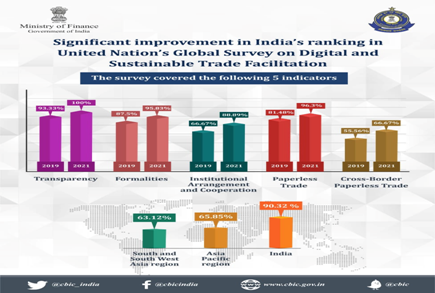India has scored 90.32% in United Nation’s Economic and Social Commission for Asia Pacific’s (UNESCAP) latest Global Survey on Digital and Sustainable Trade Facilitation. The Survey hails this as a remarkable jump from 78.49% in 2019. The survey result can be accessed at(https://www.untfsurvey.org/economy?id=IND).
After evaluation of 143 economies, the 2021 Survey has highlighted India’s significant improvement in the scores on all 5 key indicators, as follows:
- Transparency:100% in 2021 (from 93.33% in 2019)
- Formalities: 95.83% in 2021 (from 87.5% in 2019)
- Institutional Arrangement and Cooperation: 88.89% in 2021 (from 66.67% in 2019)
- Paperless Trade: 96.3% in 2021 (from 81.48% in 2019)
- Cross-Border Paperless Trade: 66.67% in 2021 (from 55.56% in 2019)
The Survey notes that India is the best performing country when compared to South and South West Asia region (63.12%) and Asia Pacific region (65.85%). The overall score of India has also been found to be greater than many OECD countries including France, UK, Canada, Norway, Finland etc. and the overall score is greater than the average score of EU. India has achieved a 100% score for the Transparency index and 66% in the “Women in trade” component.

CBIC, has been at forefront of path breaking reforms under the umbrella of ‘Turant’ Customs to usher in a Faceless, Paperless and Contactless Customs by way of a series of reforms. This has had a direct impact in terms of the improvement in the UNESCAP rankings on digital and sustainable trade facilitation.
Further, during the Covid19 pandemic, Customs formations have made all efforts to expedite Covid related imports such as Oxygen related equipments, life-saving medicines, vaccines etc.A dedicated single window COVID-19 24*7 helpdesk for EXIM trade was created on the CBIC website to facilitate quick resolution of issue(s) faced by importers.
The Global Survey on Digital and Sustainable Trade Facilitation is conducted every two years by UNESCAP. The 2021 Survey includes an assessment of 58 trade facilitation measures covered by the WTO’s Trade Facilitation Agreement. The Survey is keenly awaited globally as it evidences whether or not the trade facilitation measures being taken have the desired impact and helps draw comparison amongst countries. A higher score for a country also helps businesses in their investment decisions.
